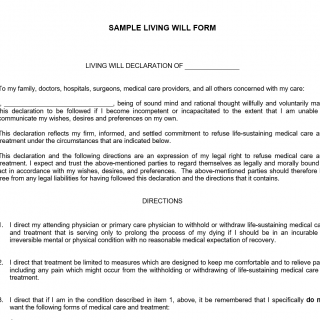Living Will Form
A living will form, is a legal document that goes into effect while you are still alive. It declares that you do not want to be kept alive by artificial life support systems. A living will form usually becomes effective when your condition is hopeless and you have no reasonable chance of recovery to a life you consider meaningful.
The term “living will” is not entirely accurate. A living will is best defined as a written declaration that informs medical personnel of your desire not to have life-sustaining procedures induced if you are diagnosed as terminally ill and you cannot participate in the decision-making process regarding your treatment, and use of life-sustaining procedures would merely prolong the dying process.
Most states agree that there are three types of conditions that would cause a living will form to take effect:
- A patient is terminally ill and death is likely to occur within a "short" amount of time (there is no legal definition of "short"; the decision is left up to the doctor)
- A patient is in a permanent unconscious condition
- A patient's burdens of treatment outweigh the benefits
Also called an advance health care directive in some states, a living will form authorizes your doctor to disconnect or withhold life support equipment so you may die a "natural death." Having a living will form can spare your family from making tough decisions for you.
Each of the fifty states (USA) have some law regarding the ability of patients to make decisions about their medical care before the need for treatment arises through the use of advance directives. The great majority of states allow for patients to draft living wills that set forth the type and duration of medical care that they wish to receive should they become unable to communicate those wishes on their own.

